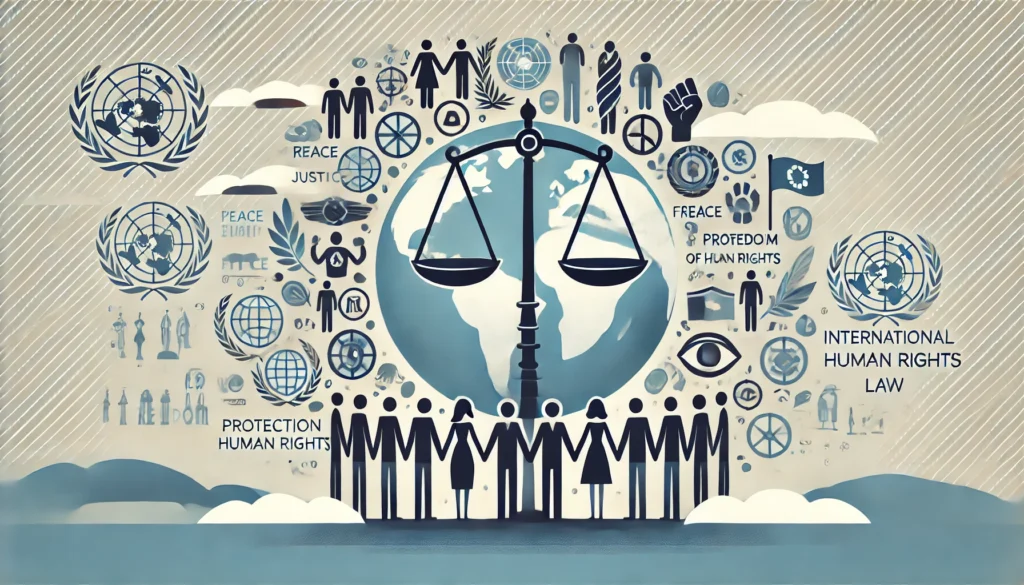Published on 1st June 2025
Authored By: M. Kiruthika
Sathyabama Institute of Science and Technology
ABSTRACT
Genocide and crimes against humanity represent the gravest violations of international criminal law, targeting not only individual victims but the very fabric of human civilization. This essay explores the historical evolution, legal definitions, and frameworks established under various international instruments such as the Genocide Convention, Rome Statute, and customary international law. It delves into notable judicial decisions that have shaped the understanding and prosecution of these crimes, including cases from the International Criminal Tribunal for Rwanda (ICTR), the International Criminal Tribunal for the former Yugoslavia (ICTY), and the International Criminal Court (ICC). Despite advancements in international justice, numerous challenges persist in the enforcement of accountability, including political interference, evidentiary difficulties, and jurisdictional limitations. The essay further analyzes emerging trends such as the application of universal jurisdiction, the role of hybrid courts, and the integration of technological tools in investigations. It concludes by reflecting on the future of global accountability mechanisms and the ongoing need to strengthen international cooperation to prevent impunity and protect human rights on a universal scale.
INTRODUCTION
Genocide and crimes against humanity are the most horrific violations known in international law, frequently resulting in mass extermination and harsh persecution of innocent individuals. These crimes are aimed to destroy not only individuals, but entire communities, cultures, and ways of life. Their punishment is not only a legal requirement, but also a moral imperative for the international community. The creation of these legal categories in the aftermath of World War II was a watershed moment in international law, resulting in a rules-based global system that prioritizes accountability and justice. While both genocide and crime against humanity share characteristics such as large-scale violence and targeted attacks against civilians, they are distinct in their legal definitions and requisite elements. Genocide is characterized by the specific intent to destroy a particular group, whereas crimes against humanity focus on widespread or systematic attacks against civilian populations, irrespective of group identity.
KEYWORDS : Genocide – Crimes Against Humanity – International Criminal Law – Rome Statute – Legal Framework – Accountability – Human Rights.
HISTORICAL BACKGROUND
Genocide
The word “genocide” was first used by Polish-Jewish attorney Raphael Lemkin in 1944, from the Greek word “genos” (race or tribe) and the Latin “-cide” (killing). The atrocities of the Holocaust prompted the Convention on the Prevention and Punishment of the Crime of Genocide to be adopted in 1948 (“Genocide Convention”). The Genocide Convention was the first time that the international community put genocide into law as a crime against international law..
Crimes Against Humanity
Crimes against humanity were first prosecuted at the Nuremberg Trials after World War II. These crimes were defined to include murder, extermination, enslavement, deportation, and other inhumane acts committed against civilian populations. Unlike genocide, crimes against humanity do not require proof of intent to destroy a particular group.
LEGAL FRAMEWORK
- Genocide Convention (1948) The Genocide Convention defines genocide and obliges states to prevent and punish the crime. It affirms that genocide, whether committed in time of peace or war, is a crime under international law. The Convention also provides for trial by competent tribunals and international cooperation.
- Rome Statute of the International Criminal Court (1998) The Rome Statute establishes the ICC and codifies genocide and crimes against humanity under Articles 6 and 7 respectively.
- Article 6 (Genocide): Defines genocide and outlines five acts committed with intent to destroy a protected group.
- Article 7 (Crimes Against Humanity): Lists acts such as murder, torture, rape, enslavement, enforced disappearance, and apartheid, when committed as part of a widespread or systematic attack.
- Customary International Law Many aspects of the Genocide Convention and crimes against humanity are recognized as customary international law, binding even on states not party to treaties.
- International Tribunals The ICTY and ICTR have significantly developed the jurisprudence on these crimes. Their statutes and decisions have clarified legal elements and standards of proof.
NOTABLE CASE LAWS
Prosecutor v. Jean-Paul Akayesu (ICTR)
Jean-Paul Akayesu, mayor of a Rwandan commune, stood accused of aiding and abetting genocide and of inciting massacres during Rwanda’s 1994 genocide. It was the first ever judgment for genocide handed down by an international tribunal. It set certain fundamental legal understandings of the crime of genocide, particularly how sexual violence may constitute an act of genocide.
Prosecutor v. Omar Hassan Ahmad Al Bashir (ICC)
Omar al Bashir, then President of Sudan, was indicted by ICC for crimes committed in Darfur, including genocide, murder, and persecution. This was the first time the ICC issued an arrest warrant for a sitting head of state for genocide. It tested the limits of state cooperation and immunity in international law.
Prosecutor v. Radovan Karadzic (ICTY)
Karadzic, the ex-President of the Republika Srpska, was prosecuted for crimes committed during the Bosnian War, including the Srebrenica genocide. The ICTY found him guilty of genocide, crimes against humanity, and war crimes, reaffirming the individual criminal responsibility of political leaders and defining genocidal intent in ethnic cleansing operations.
Prosecutor v. Germain Katanga (ICC)
Katanga, a militia leader from the Democratic Republic of the Congo, was tried for his role in the Bogoro massacre, which involved mass killing and sexual violence. The case clarified the concept of indirect co-perpetration and the use of child soldiers, and was one of the earliest full trials at the ICC resulting in conviction.
Prosecutor v. Thomas Lubanga Dyilo (ICC)
Lubanga was charged for recruiting and using child soldiers in the Ituri conflict in the DRC. This was the first ever conviction by ICC, marking a milestone in the Court’s efforts to hold perpetrators of crimes against humanity accountable.
CHALLENGES IN ENFORCEMENT
Despite significant legal developments and the establishment of international and hybrid courts, the enforcement of laws against genocide and crimes against humanity faces a variety of challenges. These range from political and practical hurdles to issues of legal consistency and victim access to justice.
- Lack of Political Will and Selective Justice
One of the biggest challenges to enforcing international criminal law is the absence of political will, particularly on the part of influential states. The success of institutions such as the International Criminal Court (ICC) relies on the cooperation of states to apprehend suspects, produce evidence, and enforce judgments. Yet, when suspects are politically powerful such as heads of state or generals states will not act. In addition, selective justice undermines the credibility of international courts. Critics argue that enforcement has disproportionately fallen on African states, while influential nations with global reach have often been exempt. This perceived bias can erode confidence in international justice mechanisms.
- Tension Between State Sovereignty and International Accountability
International prosecutions often require access to territories and jurisdictions of sovereign states. Many governments perceive international investigations and trials as an infringement on their sovereignty, especially when investigations are politically sensitive. This leads to non-cooperation, delays, or outright refusal to recognize international arrest warrants or court mandates, as seen in Sudan’s refusal to extradite Omar al-Bashir despite ICC warrants. Furthermore, some states do not recognize the jurisdiction of international tribunals or have not ratified the Rome Statute, thus remaining outside the legal reach of the ICC.
- Evidentiary and Procedural Difficulties
It is very hard to obtain reliable evidence in the context of an ongoing conflict or post-conflict disintegration. Most atrocities take place in distant or conflict areas, where access is restricted, and local infrastructure can be destroyed. Witnesses are traumatized, displaced, or afraid to testify because they fear retaliation. Moreover, there are stringent requirements of proof for international criminal law convictions, especially to establish genocidal intent (dolus specialis). Courts have to be based on a mixture of direct evidence, documentary proof, and in some cases circumstantial inference making it a tricky process.
- Non-Participation of Key Global Powers
Some of the most powerful countries in the world such as the US, Russia, china, and India have not signed the Rome Statute or accepted the jurisdiction of the ICC. Their non-membership in the system undermines the universality and impartiality of international justice. These nations can also employ their veto in the United Nations Security Council (UNSC) to veto referrals of cases to the ICC, as is the case regarding Syria.
- Lengthy Trials and Resource Constraints
International criminal trials are often lengthy, sometimes taking over a decade to conclude. The complex nature of crimes against humanity and genocide often involving hundreds of witnesses and volumes of evidence necessitates prolonged judicial proceedings. This not only burdens victims and witnesses but also raises concerns about efficiency and the right to a speedy trial. Moreover, institutions like the ICC and ad hoc tribunals face financial and logistical limitations, depending largely on contributions from member states, which may fluctuate with political tides.
- Victim Participation and Access to Justice
Although modern international courts emphasize victim participation and reparative justice, in practice, this often remains limited. Many victims are unaware of their rights or find it difficult to participate meaningfully in proceedings due to language, distance, lack of representation, or security concerns. In addition, reparations mechanisms are underdeveloped, and many victims do not receive meaningful compensation or support. Ensuring restorative justice remains an ongoing challenge.
EMERGING TRENDS AND FUTURE DIRECTIONS
- Universal Jurisdiction Some states exercise universal jurisdiction to prosecute crimes irrespective of where they occurred, enhancing accountability.
- Hybrid and Domestic Courts Examples include the Special Court for Sierra Leone and the Extraordinary Chambers in the Courts of Cambodia (ECCC), promoting localized justice.
- Technological Advancements Digital evidence and open-source investigations are improving documentation and prosecution efforts.
- Preventive Measures Early warning systems and the Responsibility to Protect (R2P) doctrine are being used to prevent mass atrocities.
CONCLUSION
Genocide and crimes against humanity remain critical areas of international criminal law. Legal advancements and jurisprudence have strengthened accountability mechanisms, yet challenges persist. A more robust international justice system depends on universal cooperation, consistent application of law, and prioritizing the voices of victims. As global conflicts evolve, the legal community must adapt, ensuring that the promise of “never again” is upheld through meaningful action.
REFERENCES
- Convention on the Prevention and Punishment of the Crime of Genocide, Dec. 9, 1948, 78 U.N.T.S. 277.
- Rome Statute of the International Criminal Court, July 17, 1998, 2187 U.N.T.S. 90.
- William A. Schabas, Genocide in International Law: The Crime of Crimes (2d ed. 2009).
- Beth Van Schaack & Ronald C. Slye, International Criminal Law and Its Enforcement: Cases and Materials (3d ed. 2014).
- Cherif Bassiouni, Crimes Against Humanity: Historical Evolution and Contemporary Application (2011).
- Antonio Cassese, International Criminal Law (2d ed. 2008).
- Robert Cryer et al., An Introduction to International Criminal Law and Procedure (4th 2019).



